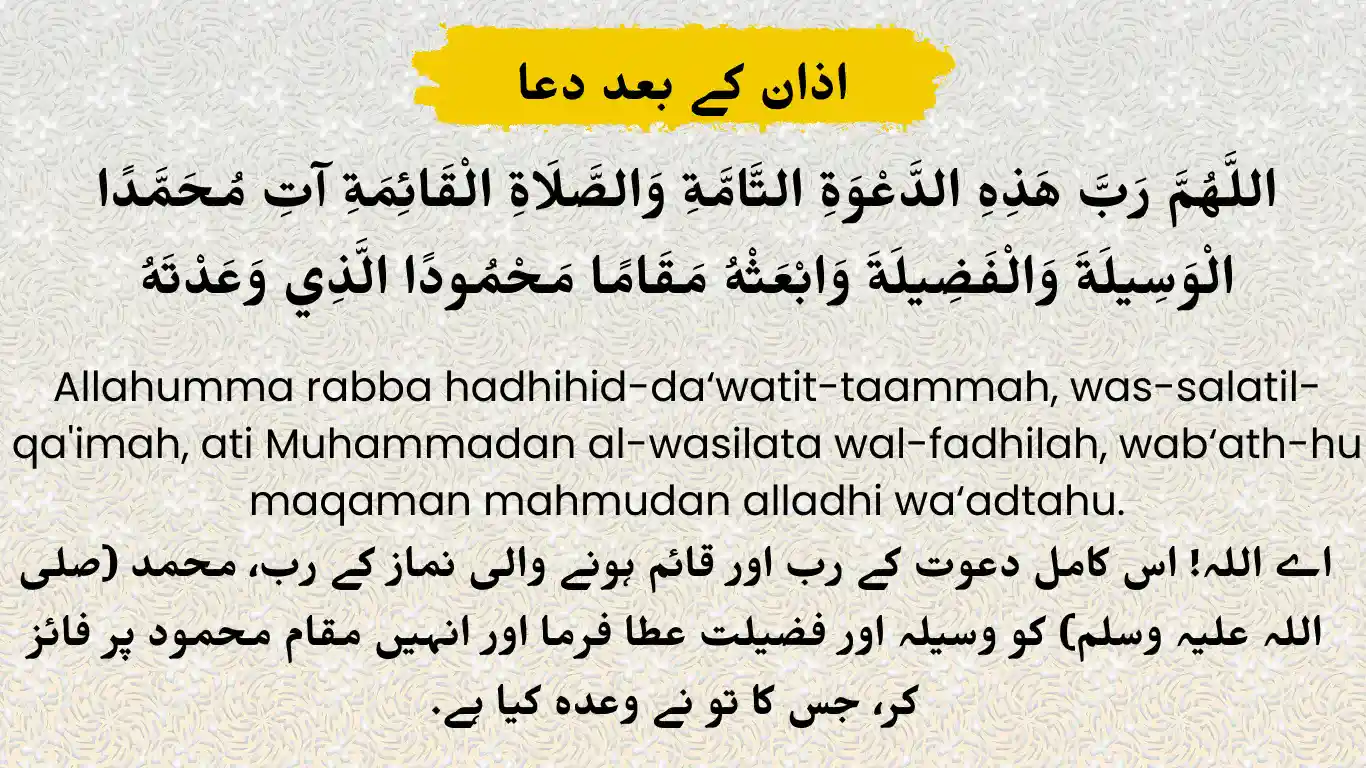The Adhan, or the Islamic call to prayer, marks a moment of spiritual connection, inviting Muslims to remember Allah and prepare for Salah (prayer). After the Adhan, it is Sunnah (a prophetic practice) to recite a specific supplication that carries immense rewards and blessings. Known as Azan ke baad ki dua, this supplication is an important practice for strengthening one’s faith and earning Allah’s pleasure.
In this article, we will discuss the dua, its Arabic text, transliteration, Urdu translation, and significance. We’ll also explore its benefits, relevance, and why every Muslim should make it a regular practice.
| Dard Ki Dua: Prayer for Relief from Pain |
| Maghfirat Ki Dua –Seeking Forgiveness |
| Bukhar Ki Dua –Relief from Fever | بخار کی دعا |
| Rizq Mein Barkat Ki Dua | دعاء رزق میں برکت |
The Dua After the Azan | اذان کے بعد دعا
The dua recited after the Adhan is as follows:
اللَّهُمَّ رَبَّ هَذِهِ الدَّعْوَةِ التَّامَّةِ وَالصَّلَاةِ الْقَائِمَةِ آتِ مُحَمَّدًا الْوَسِيلَةَ وَالْفَضِيلَةَ وَابْعَثْهُ مَقَامًا مَحْمُودًا الَّذِي وَعَدْتَهُ
Transliteration: Allahumma rabba hadhihid-da‘watit-taammah, was-salatil-qa’imah, ati Muhammadan al-wasilata wal-fadhilah, wab‘ath-hu maqaman mahmudan alladhi wa‘adtahu.
Urdu Translation:
ترجمہ: اے اللہ! اس کامل دعوت کے رب اور قائم ہونے والی نماز کے رب، محمد (صلی اللہ علیہ وسلم) کو وسیلہ اور فضیلت عطا فرما اور انہیں مقام محمود پر فائز کر، جس کا تو نے وعدہ کیا ہے۔
This dua is a request for blessings upon Prophet Muhammad (ﷺ) and for his elevated rank on the Day of Judgment.
Breaking Down the Dua
1. “Allahumma Rabba Hadhihid-Da‘watit-Taammah”
Translation: “O Allah, Lord of this perfect call.”
This phrase recognizes the Adhan as a complete and perfect call to worship Allah, emphasizing its sanctity and the importance of the message it conveys.
2. “Was-Salatil-Qa’imah”
Translation: “And (Lord of) the established prayer.”
Here, the supplicant highlights the significance of Salah (prayer) as the primary form of worship, which follows the Adhan.
3. “Ati Muhammadan Al-Wasilata Wal-Fadhilah”
Translation: “Grant Muhammad (ﷺ) Al-Wasilah and Al-Fadhilah.”
The term Al-Wasilah refers to a high position in Paradise reserved for Prophet Muhammad (ﷺ), while Al-Fadhilah means excellence and virtue.
4. “Wab‘ath-hu Maqaman Mahmuda Alladhi Wa‘adtahu”
Translation: “And raise him to the praised station You have promised him.”
This part of the dua refers to the Maqam-e-Mahmood, a praised station on the Day of Judgment where the Prophet (ﷺ) will intercede for the believers.
Significance of Azan Ke Baad Ki Dua
Reciting this dua is not only a Sunnah but also an opportunity to earn immense rewards. The Prophet Muhammad (ﷺ) said:
“Whoever says this supplication after hearing the Adhan, my intercession will be permitted for him on the Day of Judgment.”
(Sahih al-Bukhari, Hadith 614)
By reciting this dua, believers express their love and respect for the Prophet (ﷺ) and align themselves with his teachings. It is a simple yet profound way to strengthen one’s connection with Allah and His Messenger.
Benefits of Reciting This Dua
- Earning Intercession: The promise of the Prophet’s (ﷺ) intercession on the Day of Judgment is a tremendous blessing.
- Increased Rewards: Following this Sunnah regularly increases a Muslim’s good deeds.
- Spiritual Connection: It enhances the believer’s awareness of the significance of Salah and the Prophet’s role in Islamic guidance.
How to Make It a Daily Habit
- Listen Attentively: When the Adhan is called, stop all activities and listen attentively.
- Respond to the Adhan: Repeat the words of the Adhan silently after the muezzin.
- Recite the Dua Immediately After: As soon as the Adhan finishes, recite the dua with sincerity and focus.
FAQs:
Reciting the dua is a Sunnah of the Prophet (ﷺ) and carries immense rewards, including his intercession on the Day of Judgment.
Yes, it is recommended to repeat the words of the Adhan silently after the muezzin and then recite the dua at the end.
Absolutely. Women are equally encouraged to recite this dua after hearing the Adhan.
Conclusion
Reciting Azan ke baad ki dua is a beautiful practice that every Muslim should incorporate into their daily life. It strengthens our relationship with Allah, honors the Prophet Muhammad (ﷺ), and sets the tone for a spiritually fulfilling Salah. By making this dua a habit, you invite countless blessings into your life while securing a promise of intercession in the Hereafter. Let’s make an effort to recite this meaningful dua regularly and share its significance with others.




